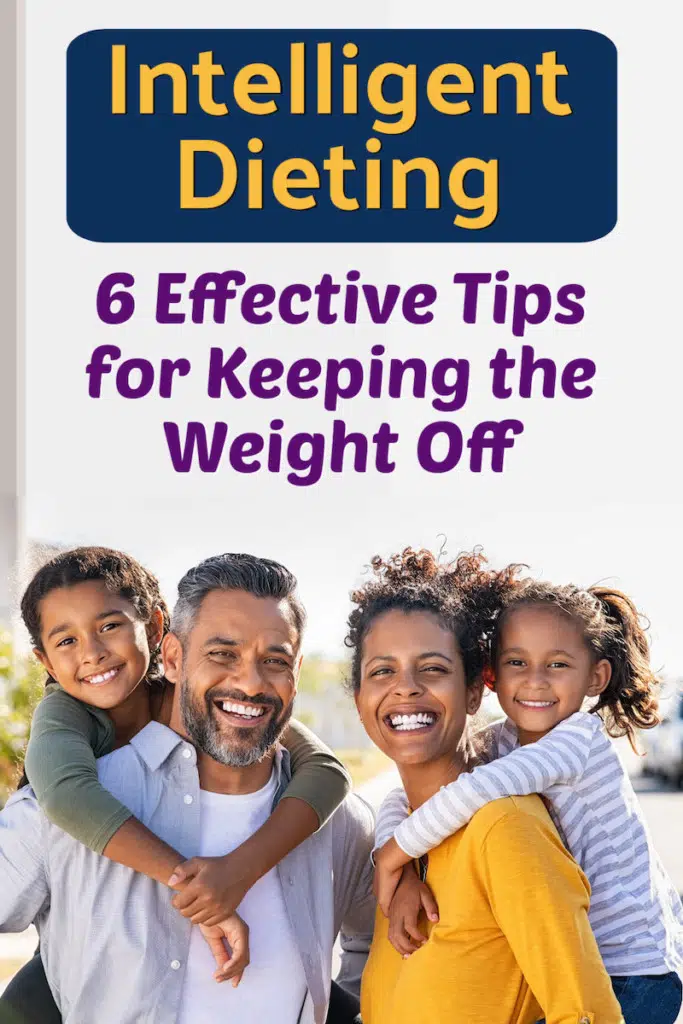Strategic dieting improves the appearance of your physique by helping tone muscle while shrinking fat cells.
The challenge with dieting is figuring out how to do it in a healthy and proven way that allows you to sustain positive results.
The Best Dieting Strategies for Long-Term Success
With the correct dieting techniques, shrinking your body’s fat cells is not too difficult. It’s keeping the fat off that can be the most challenging.
Dieting recidivism is a term referring to the tendency of dieters to eventually slip back into previous eating habits:
- Approximately 65% of people regain the weight they lost within the first year.
- Within two years, it’s 85%.
- Within three years, 95% have gained back what they lost.
- Startlingly, a significant number of those dieters will gain back even more than they lost initially.
To help you keep the weight off permanently, I encourage you to try the following six dieting tips.
1. Evolve Your Intention
What’s the why behind your diet?
There’s nothing wrong with wanting to look better naked. And there’s nothing wrong with wanting to appear trim.
However, a mindset shift is most helpful for keeping weight off permanently– shifting your priority from reducing your percentage of body fat to achieving optimal health.
By making optimal health your main objective, you stand a better chance of adopting permanent lifestyle changes.
It’s as if, by making health the priority, fat loss becomes a happy side effect instead of a temporary obsession.

2. Achieve Optimal Health Through Anti-Inflammatory Meal Plans
Inflammation accelerates aging, and the easiest way to reduce aging within your body is to stop ingesting foods that facilitate an inflammatory response.
- A good dieting plan will have you track your calories.
- An even better plan would have you tracking calories and macronutrients (in dieting, “macros” refers to the ratio of fat, carbohydrate, and protein).
- However, highly intelligent dieting has you tracking calories, macros, and inflammation.
In doing so, you dramatically increase the odds of extending the healthy years within your own lifespan.

3. Secret to Permanent Weight Loss: Seek Muscle, Not Just Cardio
Forget lazy cardio. It takes too much time and doesn’t produce commensurate results.
The human body adapts quickly to habitual movement patterns. That means your metabolism will probably not as well to that daily treadmill walk that brings your heart rate up to only 55% of its maximum.
Is it better than nothing? Sure.
But if you want genuine results, bring your heart rate up to 70% of its maximum during cardio sessions (get the green light from your doctor beforehand).
Additionally, try not to use the same piece for consecutive sessions – instead of always doing the same cardio equipment.
If you did the treadmill last time, use the bike next time. If you used the bike last time, use the vertical climber this time, etc.
Remember that digital screens on most cardiovascular equipment overestimate the number of calories burned during a workout.
The Seeking of Muscle Is a Noble Endeavor
Repeat after me: muscle is good.
The tendency is to dial up your cardio when you want to drop fat. However, in intelligent dieting, one seeks muscle because muscle cells raise the number of calories your body burns while at rest. And that is a very good thing.
So sure, do your cardio. But don’t make it more critical than strength training exercises.
Developing muscle, by the way, is quite tricky.
If you gave a professional athlete an entire year to add 6 pounds of muscle, they would have a tough time accomplishing it.
As long you’re conditioning your body parts symmetrically, there is no need to worry that you’ll add too much bulky muscle.
4. The Weight That Comes Off Slowly is the Weight That Stays Off
A healthy physique is responsive, but big dieting swings – relentlessly alternating between too many and too few calories – can make the body less responsive.
Try not to exhaust your metabolism with wild swings, especially after the age of fifty.
Maybe you’ve been overeating, and now you’re thinking, “That’s it. I’m going to go on a super diet and only eat 800 calories a day!” But if your body gets the idea that a famine is coming, it might try to hang on to as much fat as possible to protect you from the impending famine.
Unless someone is dramatically obese, I don’t see the point of losing more than a single pound each week (0.45 kilos), in most cases. This is based on decades of experience seeing which clients lose fat, get healthier, and keep the weight off even after several years.
Someone with 50 pounds of fat to lose probably doesn’t want to hear that they need to give themselves a year to lose it.
But sometimes intelligent dieting means doing what works even if it’s not what you want to hear.
When you’re figuring out what daily allotment of calories is needed to reach your new health goals, keep in mind that you might be allowed more calories than you were imagining – especially if you’ll be exercising at a higher intensity four or more times a week.
By the way, since anti-inflammatory dieting also happens to use fewer carbohydrates, you might find that you drop the first 8 pounds quickly.
Those first eight pounds are probably mostly water weight, so be sure to replenish your electrolytes. Be kind to your kidneys and stay hydrated.
5. Meal Prep: The Key to Effective and Consistent Dieting
Want to hear something weird? Most likely, it’s meal prep that will make or break your diet success.
Ironically, after all this talk – about tracking calories, macros, and inflammation – the final twist is that whether you succeed or fail in dieting will most likely be determined by your ability to effectively and consistently organize your meal preparation.
“Meal Prep” is a term referring to the process of preparing meals and snacks way before you need them.
Please believe me when I tell you that this meal-prep process is critical.

I encourage you to figure out ahead of schedule what days you will do the grocery shopping and on what day you will prepare meals.
Have your shopping lists prepared beforehand.
Most people do this by preparing all meals on a particular day (say, Saturday, for example) for the week ahead. They then freeze the meals in food storage containers.

In my case, I do meal prep twice a week. For example, I prepare an enormous batch of all-vegetable green smoothies, then store them in my refrigerator in sealed glass containers.
Even people who work from home find meal prep the key to unlocking successful dieting.
Many delivery services now ship prepared meals in stackable food storage containers today.
You can choose the calories and macro ratios ahead of time.
This makes an excellent option for those who are too busy to do any shopping or meal prep on their own.
One research study establishing meal preparation as a key to dieting success is “Meal Preparation and Meal Planning: A Comparison of Two Strategies for a Healthy Diet” (Lora Burke, 2017) in the American Journal of Preventive Medicine.
The study aimed to compare the effectiveness of two dietary interventions, meal preparation, and meal planning, on weight loss and dietary intake.
The participants were randomly assigned to one of three groups: meal preparation, meal planning, or control.
The results showed that the meal preparation group had significantly greater weight loss and better dietary intake than the meal planning group and the control group.
The authors concluded that meal preparation is a more effective dietary intervention than meal planning for weight loss and dietary improvement.
This study provides evidence that meal preparation can be an effective strategy for successful weight loss and improved dietary intake.
6. Prioritize Micronutrients
Dieting usually means intentionally consuming fewer calories daily.
However, consuming fewer calories makes it possible to accidentally consume fewer micronutrients.
Your body requires ample micronutrients to maintain healthy systems, including metabolism.
So, if you’re dieting, the calories you consume must be nutrient-dense.
Many people who diet will subsist on diet sodas and 100-calorie sweet snacks throughout the day.
They succeed in dropping scale weight – mostly lost muscle tone – and then wonder why the results from their latest blood-draw lab tests from their doctor reveal deficiencies in crucial vitamins and minerals.
The dieting illusion is when you start trying to amend your daily eating habits, but then stall because there is a particular food or beverage that you can’t imagine your life without.
That’s the illusion part.
You are not your habits. Your life is bigger than just your habits. Habits are simply that: habits. They can be changed. Perhaps challenging at first, but it does usually get easier with time.
In this video, I discuss the dieting illusion, your hierarchy of needs, and why that afternoon energy crash might not be as inevitable as you think.
Ryan joins me again to go deep into culture versus biology: People grow up with a certain diet that they consider to be normal. And so, when you think, “that’s normal,” you just assume that how you feel after you eat is also a normal response.
Around three o’clock is a natural time to kind of be more winding down in the afternoon, which may or may not actually have circadian rhythm evidence behind it. But it’s definitely exacerbated by overloading on caffeine in the morning, eating heavy things at noon, and then all of a sudden that – combined with the natural rhythms – all of a sudden equals just a plummet, you know, between three and 5pm.
But if that’s the way you’ve always felt you don’t really consider that to be anything worth noting.
That kind of probably adds to the culture in general – the fact that people aren’t looking for it, because if you don’t think there’s a problem there, you don’t register that there would even be a problem.
We are products of our culture in ways that we think we understand, but really, we have no idea right?
When I look back on my life – I mean, I literally know people who have no regrets! That’s amazing, because I have so many regrets. I mean, first of all, any time in my life previously that I hurt somebody’s feelings, whether it was inadvertently or out of anger or frustration or whatever, I totally regret. Like it was yesterday, right? Sometimes, like, you know, three in the afternoon to somebody else, and then ARGH! That memory! But, also just in terms of my lifestyle choices, such as what I ate.
Like, if I can go back in time. I mean, you know, on one hand, I believe everything happens for a reason. So maybe those experiences are helping me have this discussion with all of you right now. However, if I could go back in time, I would not eat any sugar. I would not eat cold cereal for breakfast; I would not eat toast. Now, I’m not saying those things are bad. You know, I’m just saying that for me, knowing what I know now and what the price tags are. I would not do that.
And that’s what these eating habits are: just cultural norms. These are the things we eat for breakfast, and we think nothing of them. And in fact, sometimes if we’re challenged, we actually cannot imagine our life without those things because they’re so ingrained.
I read this book once. I can’t remember the name, but it was a doctor who wrote it and he said, “if you cannot imagine your life without something, you’re probably addicted to it.”
Because the only things we really need are air, water, food, love, and shelter. We need these things. Abraham Maslow called that the hierarchy of needs. But other than those fundamental needs, of if you cannot imagine your life without, like coffee: the reason we can’t imagine life without it is because you we’re addicted to it in our own way. And so now I’m on the other side of sugar, right? I realize once you get off the junk, it, you know, it’s like a smoke clears and you see things for what they are. More clearly.
Remember, your primary goal is optimal health – so make the calories you eat worthwhile.
This is usually solved by increasing vegetable intake from various sources, including dark leafy greens, cruciferous, and the full rainbow spectrum of veggies.
Additional Resources for Sustainable Dieting:
https://www.flexsuccess.com.au/ – The Flex Success Podcast with Dean, Lizzy, and guest Brandon DaCruz
https://www.medicalnewstoday.com/articles/326002 – Research on Percentage of Maximum Heart Rate for Burning Fat Effectively
https://www.youtube.com/channel/UCPccsVArKiFcOKF16c-EF6w – Fazlifts: Possible Reasons People Don’t Lose Weight
https://www.omnicalculator.com/sports/fat-burning-zone – How to Calculate Your Target, Fat-Burning Heart Rate
